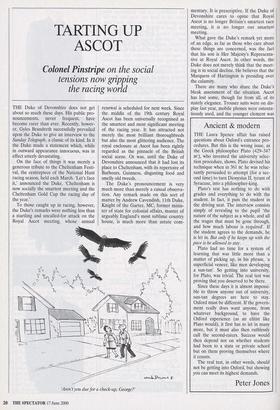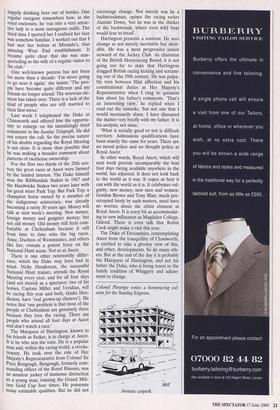TARTING UP ASCOT
Colonel Pinstripe on the social tensions now gripping the racing world
THE Duke of Devonshire does not get about so much these days. His public pro- nouncements, never frequent, have become rarer than ever. Recently, howev- er, Gyles Brandreth successfully prevailed upon the Duke to give an interview to the Sunday Telegraph, a classic of its kind. In it the Duke made a statement which, while in outward appearance innocuous, was in effect utterly devastating.
On the face of things it was merely a generous tribute to the Cheltenham Festi- val, the centrepiece of the National Hunt racing season, held each March. 'Let's face it,' announced the Duke, 'Cheltenham is now socially the smartest meeting and the Cheltenham Gold Cup the racing day of the year.'
To those caught up in racing, however, the Duke's remarks were nothing less than a startling and uncalled-for attack on the Royal Ascot meeting, whose annual
renewal is scheduled for next week. Since the middle of the 19th century Royal Ascot has been universally recognised as the smartest and most significant meeting of the racing year. It has attracted not merely the most brilliant thoroughbreds but also the most glittering audience. The royal enclosure at Ascot has been rightly regarded as the pinnacle of the British social scene. Or was, until the Duke of Devonshire announced that it had lost its place to Cheltenham, with its repertoire of Barbours, Guinness, disgusting food and smelly old tweeds.
The Duke's pronouncement is very much more than merely a casual observa- tion. Any remark made on this sort of matter by Andrew Cavendish, 11th Duke, Knight of the Garter, MC, former minis- ter of state for colonial affairs, master of arguably England's most sublime country house, is much more than astute corn- 'Aren't you due for a check-up, George?' mentary. It is prescriptive. If the Duke of Devonshire cares to opine that Royal Ascot is no longer Britain's smartest race meeting, it is no longer our smartest meeting.
What gave the Duke's remark yet more of an edge, as far as those who care about these things are concerned, was the fact that his son is Her Majesty's Representa- tive at Royal Ascot. In other words, the Duke does not merely think that the meet- ing is in social decline. He believes that the Marquess of Hartington is presiding over the calamity.
There are many who share the Duke's bleak assessment of the situation. Ascot has lost some, though far from all, of its stately elegance. Trouser suits were on dis- play last year, mobile phones were ostenta- tiously used, and the younger element was happily drinking beer out of bottles. One regular racegoer remembers how, in the royal enclosure, he 'ran into a very attrac- tive lady in a most outrageous outfit. The third time I spotted her I realised her face was somehow familiar. I worked out that I had met her before at Miranda's, that amusing West End establishment. It became quite clear that she was mas- querading as the wife of a regular visitor to the club.'
One well-known peeress has not been for more than a decade: `I'm never going to go near it again,' she insists. 'The peo- ple have become quite different and my friends no longer attend. The nouveau ele- ment has taken over. There is a lack of the kind of people who are still married to their first wives.'
Last week I telephoned the Duke at Chatsworth and offered him the opportu- nity to enlarge on his tantalisingly brief comments in the Sunday Telegraph. He did not return the call. So the precise nature of his doubts regarding the Royal Meeting IS not clear. It is more than possible that he was making a broader comment about patterns of racehorse ownership.
For the first two thirds of the 20th cen- tury the great races at Ascot were farmed by the landed interest. The Duke himself won the Ribblesdale Stakes in 1967 and the Hardwicke Stakes two years later with his great mare Park Top. But Park Top, a champion horse owned by a member of the indigenous aristocracy, was already becoming a rarity 30 years ago. Money will talk at next week's meeting. New money, foreign money and gangster money; but not old money. Old money still feels com- fortable at Cheltenham because it still from time to time wins the big races. Anne, Duchess of Westminster, and others like her, remain a potent force on the National Hunt scene. Not so at Ascot.
There is one other noteworthy differ- ence, which the Duke may have had in mind. Nicky Henderson, the successful National Hunt trainer, attends the Royal Meeting every year, and for all four days (and not merely as a spectator: two of his horses, Captain Miller and Veridian, will be racing this year and both, thinks Hen- derson, have 'real grown-up chances'). He notes that 'one problem is that most of the People at Cheltenham are genuinely there because they love the racing. There are people who attend all four days at Ascot and don't watch a race.'
The Marquess of Hartington, known to his friends as Stoker, is in charge at Ascot. It is he who sets the tone. He is a popular man and, within the racing world, a revolu- tionary. He took over the role of Her Majesty's Representative from Colonel Sir Piers Bengough. Bengough, formerly com- manding officer of the Royal Hussars, was an amateur jockey of immense distinction as a young man, winning the Grand Mili- tary Gold Cup four times. He possesses many estimable qualities. But he did not encourage change. Not merely was he a backwoodsman, opines the racing writer Alastair Down, 'but he was in the thicket of the backwoods, where even wild boar would fear to tread'.
Hartington presents a contrast. He sees change as not merely inevitable but desir- able. He was a most progressive senior steward of the Jockey Club. As chairman of the British Horseracing Board, it is not going too far to state that Hartington dragged British racing kicking and scream- ing out of the 19th century. He was palpa- bly torn between filial affection and his constitutional duties as Her Majesty's Representative when I rang to question him about his father's comments. 'That's an interesting view,' he replied when I read out the remarks, 'but not one that I would necessarily share. I have discussed the matter very briefly with my father. It is his analysis, not mine.
'What is socially good or not is difficult territory. Admissions qualifications have been exactly the same for years. There are no moral police and no thought police at Royal Ascot.'
In other words, Royal Ascot, which will next week provide incomparably the best four days racing available anywhere in the world, has adjusted. It does not look back to the world as it was. It copes as best it can with the world as it is. It celebrates vul- garity, new money, new men and women. Gordon Brown and Tony Blair, much pre- occupied lately by such matters, need have no worries about the elitist element at Royal Ascot. It is every bit as accommodat- ing to new influences as Magdalen College, Oxford. There is even talk that Robin Cook might make a visit this year.
The Duke of Devonshire, contemplating Ascot from the tranquillity of Chatsworth, is entitled to take a gloomy view of this, and other, developments. So do many oth- ers. But at the end of the day it is probably the Marquess of Hartington, and not his father the Duke, who is being truest to the family tradition of Whiggery and adjust- ment to change.
Colonel Pinstripe writes a horseracing col- umn for the Sunday Express.
Jurassic caipark











































































 Previous page
Previous page